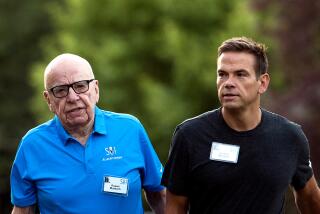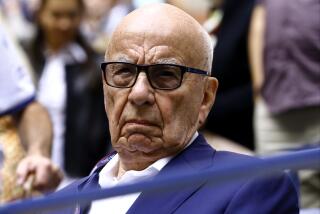One Big Deal After Another
ISMANING, Germany — Leo Kirch, reclusive German media tycoon, hasn’t always been the sort of man who could drop $5 billion in Hollywood, as he has in the past few months.
Forty years ago, he rattled around the German countryside in a secondhand Volkswagen, the very picture of a lean and hungry village youth determined to make good. He was trying to peddle a sad, simple movie called “La Strada,” by an unknown Italian named Federico Fellini.
Kirch, who also was eking out a living as a teaching assistant in the University of Munich business school, had traveled to Rome that year with an arts-loving, Italian-speaking friend. There, they happened onto the set of “La Strada,” where they learned that Fellini was running out of money for his project.
Kirch had the good sense to borrow the $54,000 Fellini needed--a king’s ransom in those hardscrabble postwar days--and, in exchange, he got the German rights to the film.
“Kirch is a man who has visions,” says Hans Hege, a German state media regulator and normally a man with few compliments for the powerful Kirch. Indeed, few others in 1956 would have gambled on “La Strada”: The loans were huge, Fellini was unknown, the plot was melancholy and cinema tastes in postwar Germany ran strictly to the upbeat.
But off went Kirch in his Beetle, beating the streets and byways of small-town Germany, promoting the movie to one theater after another. And when “La Strada” became a classic, Kirch cashed in.
“This incident is very important in understanding this man,” says Michaela Niemeyer, a Kirch spokeswoman. “Whatever he does, he tries to get to the very bottom of it.”
Today, at 69, Kirch is known as Germany’s foremost media baron--if “known” is the right word. Few really know Leo Kirch. Although he has built an empire in the mass media, made a fortune from publishing and broadcasting, he never talks to journalists.
Well, almost never. In a career spanning four decades, he has given three interviews, all nearly 10 years ago.
“He doesn’t think that it’s necessary,” Niemeyer says. “He is a businessman, and he thinks people should judge him by his work.”
So, how to take the measure of this nearly invisible heavyweight, who has been snapping up big-bucks Hollywood output like a nostalgic fan at the Jacqueline Kennedy Onassis auction?
German regulators and journalists have tried to figure out Kirch, to sort out the complex, interlocking tangle of his business holdings, or to learn precisely where his buy-up money comes from.
No luck. As the owner of a privately held company, Kirch is not required to report his earnings, and his net worth is anybody’s guess. The business media have estimated his personal fortune at $1.5 billion and his annual business revenues at $4 billion, but his spokeswoman will not confirm either figure.
“It’s very difficult with a man like Kirch,” broadcasting regulator Hege, who once resigned a national post in protest of Kirch’s behind-the-scenes power plays, says with a sigh. “If he cooperates with someone like [Italian media titan and former Prime Minister Silvio] Berlusconi, they don’t even need a written agreement. They use banks in Luxembourg, so we can’t get any information. They don’t have the normal components of business life. No board, no controllers, no transparency.”
*
For years, Germans have worried, too, about Kirch’s potential for political influence. He is a conservative Roman Catholic who lives near Munich with his wife, Ruth. He is all but unknown on the Munich social scene. His only recent public appearance was at a screening, in a Dresden church, of a dramatization of the Old Testament.
From time to time, a federal investigator will come to call: In March, the tax authorities swooped down on his headquarters here, a plain building without so much as a sign announcing who reigns within. They seized records in an apparent attempt to document tax evasion on a $360-million film sale to the Swiss retailing magnate Otto Beisheim, a friend of Kirch’s.
But so far, nothing has come of the raid. That is typical of Kirch’s ability to outfox his would-be regulatory masters, says Michael Radtke, the author of a critical Kirch biography.
“There is not a single institution in this country, not a single law, that can stop this power,” Radtke says. “It’s a huge, ever-growing, incomparable concentration, a melange of business, media and politics.”
From this small town north of Munich, Kirch directly controls Germany’s second-largest private television network, SAT-1. And between him and his son, Thomas, 38, the family wields influence over four other German networks, either through ownership stakes or by supplying programming.
Kirch also holds a major stake in Germany’s huge Axel Springer publishing group, which prints, among other things, Europe’s biggest-circulation tabloid, Bild-Zeitung. Other Kirch print and electronic media holdings extend to Austria, Italy, Spain and Eastern Europe. He has his hand in such related areas as film production, music recording, dubbing and merchandising.
*
But Kirch’s trump card is 1.1 million reels of film, acquired over 40 years and lovingly stored in huge refrigerated silos under the fields of southern Bavaria. Some vaults are lined with copper to keep out cosmic rays and other potential tape-destroyers; others have air-lock doors.
Kirch’s people report gleefully that Hollywood studios sometimes come here to get prints of their own classics--because Kirch is the only one who preserved decent copies.
And even all this has not been enough for Kirch. At an age when other executives are tying flies and working on their approach shots--and at an age when his own eyesight is going fast--he is focusing his unworldly energies on positioning his company at the front of the European pack for the dawning digital-television age.
“He works Saturdays, Sundays, evenings, and he’s also active in the mornings,” Niemeyer says. “His main hobby is his job. It is his life.”
With the advent of the digital era, populous, wealthy Germany has risen as the world’s second-hottest television market, after the United States. And in July, Kirch won Round 1 in the battle for digital dominance here, when he became the first to launch a digital television service.
(Kirch’s huge northern German rival, the Bertelsmann Group, plans to start offering digital television this fall, in an alliance with six other state and private concerns.)
Available so far is the Kirch Group’s DF1, a basic digital service of 17 themed channels, and a costlier service that adds two sports channels to the menu.
“But we can do 50 channels now, and when we have the sixth dish up, we will have the capability for 100 channels,” says Dietrich Gzuk, Kirch’s chief of audiovisual services, pointing to where four satellite dishes already stand outside the technical-services building.
The need to fill up all these coming digital channels has brought Kirch to the attention of Southern California’s entertainment businesses, which are relying on foreign markets to drive growth. Even with his vast library, he needs more programming, and the result has been one record-breaking deal after another:
* In February, Columbia TriStar International Television cut what executives said was its biggest foreign TV deal ever, selling Kirch the rights to TV shows from the 1996-97 season onward, feature films dating to last January, and library holdings ranging from “Lawrence of Arabia” to “Close Encounters of the Third Kind.” No price tag was revealed, but sources valued the arrangement between $700 million and $1 billion.
* In April, Kirch paid a reported $1.3 billion for rights to carry Viacom Inc.’s cable channels--MTV, VH1 and Nickelodeon--on his new digital service, and for free- and pay-TV rights to the output of Viacom’s Paramount Pictures.
* In July, Warner Bros. International Television made its largest-ever TV deal, estimated at $800 million, selling Kirch film features dating back to 1995, and the right to carry a German version of Warner’s upcoming entertainment channel on his digital service. The arrangement also gives Warner Bros. a chance to acquire an equity stake in Kirch’s DF1.
* In July, MCA announced a $1-billion deal with Kirch, giving the German the right to carry two MCA-programmed channels--an “action” channel and a classic-films channel--on his DF1.
* Last week, the Walt Disney Co. announced an exclusive 10-year deal to sell Kirch the right to air Disney’s live-action films on his pay television systems. Sources estimated the value of the deal at $1.3 billion over the life of the agreement. With the Disney pact, Kirch was now in alliance with the six largest movie studios.
Kirch has been busy outside Hollywood too. In July, with Switzerland’s Sporis Holdings, he spent an unprecedented $2.25 billion on the rights to broadcast the 2002 and 2006 World Cup soccer games. The gigantic bid angered the group of European public broadcasters that traditionally handles the World Cup, but the group couldn’t come close to matching the bid.
Such displays of wealth and power cause angst among the many postwar Germans who like their business people small-scale and politically impotent.
“We have had these bad times in our past, and we must never forget this,” Hege says. “Just think of [Joseph] Goebbels, and you’ll see why we cannot allow any one person to have too much power. Kirch is a democratic man, but someone else could be controlling the Kirch company in 10 or 20 years, and if it gets too powerful, you will never be able to stop it.”
*
There are those who think it’s already too late. No one has forgotten the 1994 elections, when SAT-1 took to promoting the incumbent, Chancellor Helmut Kohl, to the point where Germans called the network der Kanzler-sender, or “the chancellor station.”
Every few weeks during the campaign season, SAT-1 aired a program called “To the Point, Chancellor,” which looked like a freewheeling interview program but in fact gave an admiring host--a member of the Bavarian sister party to Kohl’s Christian Democratic Union--the chance to ask scripted questions. Kohl, who normally shuns the media, responded with long, self-promoting digressions.
The show was reviled by the other news media, and as soon as the elections were over--and Kohl had won--SAT-1 dropped it.
“It is important to say goodbye to the illusion that the machinations of this media king are apolitical,” biographer Radtke concludes from the incident. “People say that [the rise of a Berlusconi] couldn’t happen in Germany, but the opposite is true. It can happen in Germany. The difference is, the coup is already in progress, but it is difficult to see.”
Kirch was born the son of a small vintner in south-central Germany, and he started out in a lowly village school before he was spotted by a priest with an eye for intelligent youngsters and tracked into a school for the university-bound.
He was 13 when World War II began--too young to be drafted--so he wound up in the Reich’s Work Service, the conscript labor pool that ran ammunition factories, cleared bomb rubble and kept the farms going.
When peace came, Kirch returned to his studies and earned a doctorate in mathematics and economics. He made money selling such dime-store wares as needles and mirrors; eventually, he took his big chance on “La Strada.” Although he will not reveal his profit, Kirch easily paid off his bank loans and continues to collect royalties every time the movie or its video is shown in Germany.
When Fellini paid the bills, Kirch went to Italy and bought the rights to Franco Rossi’s little-known “Amici per la Pelle.” When the movie houses wouldn’t nibble, he got another idea: Sell it to TV.
*
That was another example of Kirch’s knack for dreaming the grand dream--because the idea ran counter to the prevailing norms and assumptions of the entertainment industry of the day. Television was in its infancy in Germany; few people owned sets and the only network going was a public service set up by the occupying British forces, offering about four hours of news and culture a day.
Movie people saw this upstart medium as the enemy and had organized a boycott.
Kirch’s plan was to break it.
He sold “Amici per la Pelle” to the fledgling network, became Public Enemy No. 1 to theater owners and never looked back.
Soon he was in Poland, picking up early Roman Polanski works and films by the director Andrzej Wajda. By 1960, he had founded his first film-library company, BetaFilm, and done his first deal in Hollywood: the German-language rights to 400 films by United Artists-Warner Bros.
American studios found it easier to sell to Kirch than to market films in Germany themselves, and Germany’s public broadcasters--a second public channel was created in the 1960s--were equally glad to let Kirch do their buying for them.
Outside the industry, there always has been grumbling as Kirch grew larger and froze out rivals. It didn’t seem right, the critics said, that one man was getting so rich off a publicly financed medium.
And in 1985, when Germany finally began to grant private television licenses, it was clear just how rich and powerful Kirch had become: Now the vintner’s son had the means to own his own channel. Alas for the public broadcasters: Armed with sleepy fare such as “Flipper” and “Lassie” reruns that Kirch had been selling them all those years, they were no match for his aggressive new SAT-1, which could draw from the vast supply of lively American fare in the mega-dealer’s library.
Hege, the regulator, says he finds it troubling that Kirch can thus supply the TV market at the same time that he operates a network. And now, with the digital era dawning, Hege sees a new opportunity for Kirch to control markets and obliterate the competition.
This summer, just before launching DF1, Kirch agreed to cooperate with archrival Bertelsmann on a single, shared decoder--the set-top box that digital-TV subscribers need to unscramble the signals.
“If Time Warner were to cooperate with ABC, then you would have a similar structure to what we now have in Germany,” Hege says. “For the future, I think we have to see that Kirch doesn’t control everything in the digital world.”
More to Read
Only good movies
Get the Indie Focus newsletter, Mark Olsen's weekly guide to the world of cinema.
You may occasionally receive promotional content from the Los Angeles Times.









